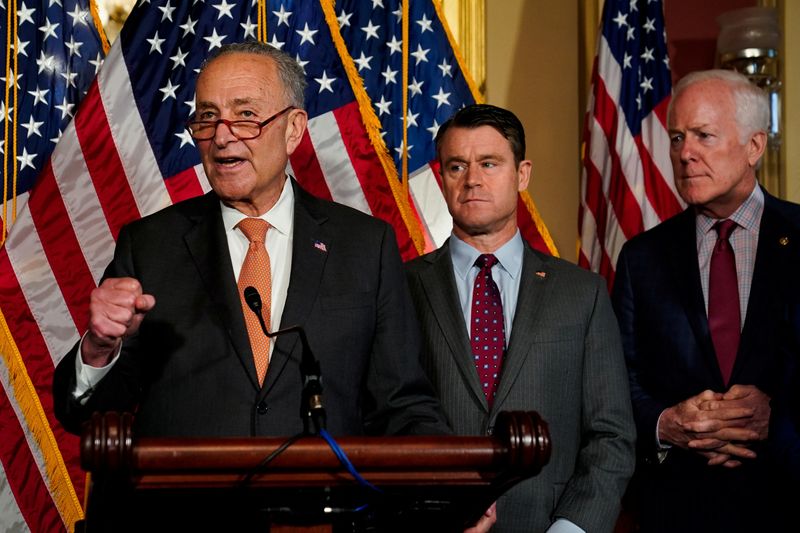U.S. Senate Democrats weigh $430 billion spending and tax hike plan
2022.07.28 18:14

U.S. Senate Majority Leader Chuck Schumer (D-NY) speaks as U.S. Senators Todd Young (R-IN) and John Cornyn (R-TX) listen during a news conference after the U.S. Senate passed legislation to subsidize the domestic semiconductor industry, at the U.S. Capito
By Richard Cowan
WASHINGTON (Reuters) – U.S. Senate Democrats huddled on Thursday to weigh a breakthrough $430 billion drugs and energy bill agreed to by Majority Leader Chuck Schumer and maverick Democrat Joe Manchin which they say will help fight the nation’s inflation problem.
But with Congress set to begin a summer recess by the end of next week, Schumer faces a tricky road to quick passage for the bill, which would be a win for Democratic President Joe Biden.
Schumer first must persuade every one of the 50 Democratic and independent senators who make up his caucus to stick together in the face of what is expected to be a solid wall of Republican opposition.
Democratic Senator Kyrsten Sinema, who, like Manchin, has blocked her party’s legislative priorities in the past, has not weighed in on the proposal. But she has in the past supported the idea of a 15% minimum tax on the most profitable U.S. companies.
The new deal revealed late Wednesday contains a 15% corporate minimum tax to help finance the $430 billion in new spending on energy, electric vehicle credits and health insurance.
With a spate of COVID-19 cases already slowing the Senate’s business over the past week, Schumer also will have to hope that his 50 senators stay well enough to cast their votes on this massive bill. A win could boost Democratic lawmakers’ election prospects in November, giving them a better chance of retaining control of Congress.
The No. 2 Senate Democrat, Dick Durbin, on Thursday said he has COVID. Schumer and some other Democrats, including Manchin himself, recently recovered from the virus.
Schumer intends to pass the bill, which would provide about $370 billion over a decade to boost alternative energy and energy security, through a process known as reconciliation. The procedure enables passage with just Democrats’ simple majority support, instead of the 60 votes needed in the 100-member chamber to advance most bills, making some Republican backing necessary.
The Schumer-Manchin deal, negotiated in secret over months, won praise from a White House spokesperson as “an enormous step forward.”
Republicans and some environmental groups attacked it.
Senator John Barrasso, a member of the Senate’s Republican leadership, criticized the 15% corporate minimum tax and new spending, which he called “reckless” at a time of high inflation.
Meanwhile, new incentives for drilling for fossil fuels have some environmental groups fuming.
“This is a climate suicide pact. It’s self-defeating to handcuff renewable energy development to massive new oil and gas extraction,” said Brett Hartl, government affairs director at the Center for Biological Diversity, an advocacy group based in Tucson, Arizona.
But the $370 billion, down from Democrats’ earlier call for $555 billion, would cut U.S. carbon emissions blamed for climate change by 40% by 2030. Leah Stokes, a professor of climate and energy policy at the University of California, Santa Barbara, called the legislation “absolutely transformative.”
A separate component of the package would allow Medicare, the government-run healthcare program for the elderly and disabled, to negotiate prescription drug prices. It is an idea voters embrace as a way of lowering medical costs that contribute to inflation. It also caps out-of-pocket costs for seniors at $2,000 annually.
The measure also includes heavy investments in electric vehicles in an effort to put a large dent in carbon emissions. The legislation would help lower the price of used EVs and provide incentives to manufacturers to increase their production.
Republicans have attacked such investments, arguing that most Americans cannot afford EVs, with an estimated average price of around $60,000. There are a few vehicles that retail for under $30,000, and the administration is pressing for new tax credits to make EVs more cost-competitive.
Instead, they want Biden to encourage more domestic oil and natural gas production to lower gasoline prices, even though that would boost emissions of carbon and other pollutants.
“Let’s not hear any more talk about EVs when we have a solution right in front of us,” said Republican Senator Joni Ernst, referring to domestic drilling.








